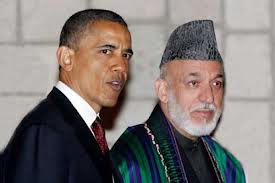 President Obama and Afghan President Hamid Karzai said today that most U.S. combat operations in Afghanistan would end this spring, signaling a quickening troop drawdown that will bring the decade-long war to a close at the end of 2014.
President Obama and Afghan President Hamid Karzai said today that most U.S. combat operations in Afghanistan would end this spring, signaling a quickening troop drawdown that will bring the decade-long war to a close at the end of 2014.
“Our troops will continue to fight alongside Afghans when needed, but let me say it as plainly as I can: Starting this spring, our troops will have a different mission — training, advising, assisting Afghan forces,” Obama announced at an East Room news conference in Washington.
“It will be a historic moment and another step toward full Afghan sovereignty, something I know that President Karzai cares deeply about, as do the Afghan people,” he said.
Administration officials said Afghan forces were “exceeding initial expectations” in their capabilities. Afghan security forces are expected to lead 90 percent of security operations across the country in February.
“By the end of next year — 2014 — the transition will be complete,” Obama said. “Afghans will have full responsibility for their security, and this war will come to a responsible end.”
The rosy assessments belied the serious political, economic and security challenges that remain.
Left unanswered by Obama and Karzai: How many U.S. troops might stay after 2014; what their mission would be and whether they could be effective; and whether the forces would have immunity from prosecution in Afghan courts.
Obama said he was still reviewing recommendations from the Pentagon and will make an announcement in the coming weeks after penning an anticipated bilateral security agreement with Afghanistan. Karzai said the exact number would be up to the United States to decide.
Both leaders confirmed in a statement that the United States “does not seek permanent bases in Afghanistan.”
They also agreed today to turn over battlefield combatants held by the U.S. military in Afghanistan to Afghan government control, which has been long-sought by Karzai.
Roughly 66,000 U.S. troops are serving in Afghanistan. The military has proposed keeping several thousand troops in the country after 2014 as advisers, trainers and logistical support for Afghan forces; the White House has said it remains open to pulling out all troops entirely.
Obama’s visit with Karzai was the first face-to-face encounter since the November election and since last year’s dramatic increase in so-called green-on-blue attacks, when U.S. and NATO soldiers have been killed by the Afghans they are training or working alongside.
There were 45 insider attacks in 2012 that resulted in 62 deaths among coalition forces, including 35 Americans. There has been one attack already in the first 11 days of 2013.
The White House summit included a private Oval Office meeting between Obama, Karzai and Vice President Joe Biden. The trio also attended a private lunch in the Old Family Dining Room.
Karzai Thursday attended meetings with Defense Secretary Leon Panetta and top military brass at the Pentagon, where he was afforded all the pomp and circumstance accorded a head of state: a 21-gun salute, and marching bands and honor guards from the Army, Navy, Air Force, Marines and Coast Guard.
Karzai’s relationship with the United States has at times been a rocky one as he has sometimes made critical statements about the allied troop presence in his country. U.S. officials believe he has made those comments out of political expediency to improve his standing with Afghans and show his independence.
Coalition forces have been transitioning security to Afghan forces in the past year, so that by now they are in the lead for security in areas where 76 percent of the Afghan population lives.
Despite that, most Afghan military units still remain unable to work independently of the logistical and combat support provided by the United States and its allies. Besides the 66,000 U.S. troops, there are 34,000 troops from other NATO countries, serving alongside Afghanistan’s 352,000 security forces.
U.S. troops continue to partner with Afghan troops in preparation for withdrawal, although the rapid spike in insider attacks last year has created new challenges.
It is against this backdrop that Karzai assured officials it “will be able to provide security to its people and to protect its borders so Afghanistan will not ever be threatened by terrorists from across our borders.”
Obama was equally sanguine today. “Afghanistan still has work to do to accomplish those goals, but there’s no doubt that the possibility of peace and prosperity in Afghanistan today is higher than before we went in,” he said.
“Have we achieved everything that some might have imagined us achieving in the best of scenarios? Probably not,” Obama conceded. “This is a human enterprise and, you know, you fall short of the ideal.
“Did we achieve our central goal, and have we been able, I think, to shape a strong relationship with a responsible Afghan government that is willing to cooperate with us to make sure that it is not a launching pad for future attacks against the United States?
“We have achieved that goal. … And for that, I think, we have to thank our extraordinary military, intelligence and diplomatic teams as well as the cooperation of the Afghan government and the Afghan people.”
ABC News

Leave a Reply
You must be logged in to post a comment.